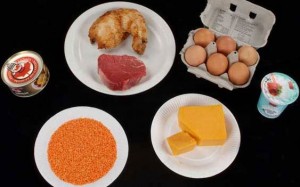Why do we need protein?
Protein is one of the big three macronutrients along with carbohydrates and fat. Adequate protein intake is essential for good health: It’s necessary for maintaining the body’s normal growth and its muscle mass (which is mostly protein), its immune system, and heart and respiratory functions.
So how much protein do you need?
As a general rule, between 10 percent and 15 percent of your total calories should come from protein. So, if you consume 2,000 calories per day, at least 200 should come from protein, or about 50 grams. You should try to eat around one gram of protein per one kilogram of body weight, or around 0.4 grams per pound. An easier way to figure this out in your head is to take your weight, divide it in half, and subtract 10. The total will be the number of grams of protein you should consume each day. So, if you weigh 120 pounds, you should eat about 50 grams of protein. If you do exercise however, your protein needs may increase since resistance training and endurance workouts can rapidly break down muscle protein.
As a general rule, between 10 percent and 15 percent of your total calories should come from protein. So, if you consume 2,000 calories per day, at least 200 should come from protein, or about 50 grams. You should try to eat around one gram of protein per one kilogram of body weight, or around 0.4 grams per pound. An easier way to figure this out in your head is to take your weight, divide it in half, and subtract 10. The total will be the number of grams of protein you should consume each day. So, if you weigh 120 pounds, you should eat about 50 grams of protein. If you do exercise however, your protein needs may increase since resistance training and endurance workouts can rapidly break down muscle protein.
Can you get too much protein?
Not really. Generally, the only danger is if you have liver or kidney disease. That’s because these organs are your body’s “workhorses” that metabolize protein. So, if you have kidney or liver disease, such as cirrhosis or fatty liver, talk to your doctor.
Not really. Generally, the only danger is if you have liver or kidney disease. That’s because these organs are your body’s “workhorses” that metabolize protein. So, if you have kidney or liver disease, such as cirrhosis or fatty liver, talk to your doctor.
Ok, so what are the best sources of protein?
This is obviously going to vary depending on what type of diet you follow such as vegetarian or eating clean. But the key is to focus on lean proteins.
Egg whites
Turkey and chicken breast – stick to the white meat
Seafood – sole, cod, or salmon fillets, shrimp and even sushi!
Tofu
Beans
Soy
Dairy – non-fat or low fat milk, yogurt or cheese. Choose dairy carefully because calories and fat can easily add up.
And of course low-fat healthy Supplement shakes like shakeology and whey protein
Did ya know the word “protein” is derived from a Greek root meaning “of first importance”? For good reason! Your body needs it!
~~~~~~~~~~~~~~~~~~~~~~~~~~~~~~~~~~~~~~~~~~~~~~


